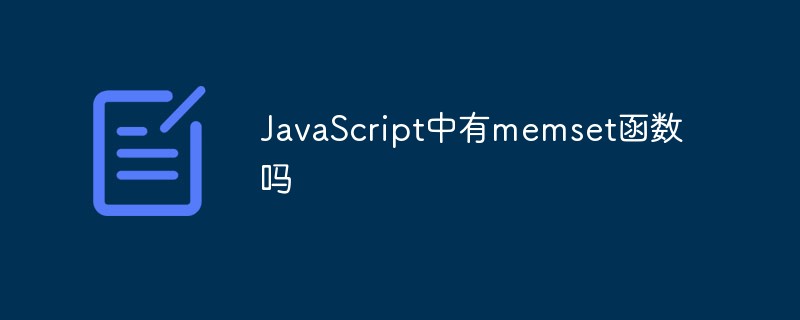
There is no memset() function in JavaScript; the memset() function is a "C/C" language initialization function. Its function is to set all the contents in a certain memory to a specified value. This function is usually for new applications. The memory is initialized, and this function cannot be used in JavaScript.

The operating environment of this tutorial: Windows 10 system, JavaScript version 1.8.5, Dell G3 computer.
There is no memset() function in JavaScript
memset is the C/C language initialization function in the computer. Its function is to set all the contents in a certain memory to a specified value. This function usually initializes the newly requested memory.
void *memset(void *s, int ch, size_t n);
Function explanation: Replace the n bytes (typedef unsigned int size_t) following the current position in s with ch and return s.
memset: The function is to fill a given value in a memory block. It is the fastest way to clear a larger structure or array [1].
memset() function prototype is extern void *memset(void *buffer, int c, int count) buffer: is a pointer or array, c: is the value assigned to the buffer, count: is the length of the buffer .
Write a program below:
# include <stdio.h>
# include <string.h>
int main(void)
{
int i; //循环变量
char str[10];
char *p = str;
memset(str, 0, sizeof(str)); //只能写sizeof(str), 不能写sizeof(p)
for (i=0; i<10; ++i)
{
printf("%d\x20", str[i]);
}
printf("\n");
return 0;
}According to the different memset functions, the output results are also different, which are divided into the following situations:
memset(p, 0, sizeof(p)); //地址的大小都是4字节 0 0 0 0 -52 -52 -52 -52 -52 -52 memset(p, 0, sizeof(*p)); //*p表示的是一个字符变量, 只有一字节 0 -52 -52 -52 -52 -52 -52 -52 -52 -52 memset(p, 0, sizeof(str)); 0 0 0 0 0 0 0 0 0 0 memset(str, 0, sizeof(str)); 0 0 0 0 0 0 0 0 0 0 memset(p, 0, 10); //直接写10也行, 但不专业 0 0 0 0 0 0 0 0 0 0
Related recommendations: javascript learning tutorial
The above is the detailed content of Is there a memset function in JavaScript?. For more information, please follow other related articles on the PHP Chinese website!